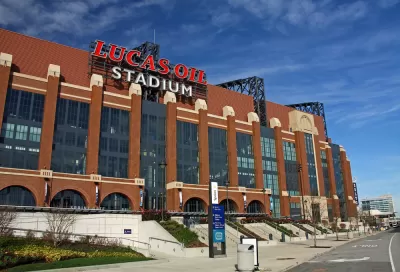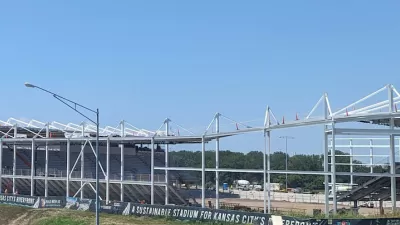Are you ready for some football…stadiums to receive massive subsidies from the federal government?

Ted Gayer, Austin J. Drukker, and Alexander K. Gold write a blog post introducing a new paper on the federal subsidies devoted to private sports stadiums in the United States.
The article opens with the example set by the house that replaced the "House that Ruth Built": the new Yankee Stadium that opened in 2009. The stadium received $1.7 billion in tax-exempt municipal bonds, which amounts to a $431 million federal subsidy. The stadium's financing is also responsible for another $61 million in lost federal tax revenues: "High-income taxpayers holding the bonds receive a windfall tax break, resulting in an even greater loss of revenue to the federal government."
The new paper by the Brookings team finds 35 examples of tax-exempt bond financing of professional sports stadiums since 2000.
All together, the federal government has subsidized newly constructed or majorly renovated professional sports stadiums to the tune of $3.2 billion federal taxpayer dollars since 2000. But because high-income bond holders receive a windfall gain for holding municipal bonds, the resulting loss in total revenue to the federal government is even larger at $3.7 billion.
The article also includes an interactive menu of federal financing for stadiums, with stadiums from Major League Baseball, the National Football league, the National Basketball Association, an the National Hockey league included.
The study also recommends a way to end the subsidy gravy train for private sports stadiums: eliminate the private payment test for stadiums. "By doing so, any stadium used primarily for 'private business use' (that is, all professional sports stadiums) would no longer be eligible to receive federal tax-exempt financing," according to the article.
FULL STORY: Why the federal government should stop spending billions on private sports stadiums

Maui's Vacation Rental Debate Turns Ugly
Verbal attacks, misinformation campaigns and fistfights plague a high-stakes debate to convert thousands of vacation rentals into long-term housing.

Planetizen Federal Action Tracker
A weekly monitor of how Trump’s orders and actions are impacting planners and planning in America.

In Urban Planning, AI Prompting Could be the New Design Thinking
Creativity has long been key to great urban design. What if we see AI as our new creative partner?

King County Supportive Housing Program Offers Hope for Unhoused Residents
The county is taking a ‘Housing First’ approach that prioritizes getting people into housing, then offering wraparound supportive services.

Researchers Use AI to Get Clearer Picture of US Housing
Analysts are using artificial intelligence to supercharge their research by allowing them to comb through data faster. Though these AI tools can be error prone, they save time and housing researchers are optimistic about the future.

Making Shared Micromobility More Inclusive
Cities and shared mobility system operators can do more to include people with disabilities in planning and operations, per a new report.
Urban Design for Planners 1: Software Tools
This six-course series explores essential urban design concepts using open source software and equips planners with the tools they need to participate fully in the urban design process.
Planning for Universal Design
Learn the tools for implementing Universal Design in planning regulations.
planning NEXT
Appalachian Highlands Housing Partners
Mpact (founded as Rail~Volution)
City of Camden Redevelopment Agency
City of Astoria
City of Portland
City of Laramie




























